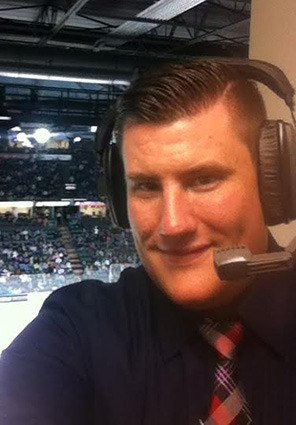Orcas Island native and Bellingham resident Merrick Parnell has been a long-time fan of the game of hockey. His passion for the game runs deep and it’s that passion that led to an experience of a lifetime for Parnell.
On March 15, Parnell was given a shot to provide the color commentary for a radio broadcast with the Victoria Royals as they played against the Everett Silvertips in a hard-hitting Western Hockey League match up.
As a color commentator, Parnell worked alongside the Royal’s long-time announcer Marlon Martens. In his role, Parnell described the action and filled in stoppages of play with analysis, facts and information, helping the broadcast paint a vivid image of the game, the arena and the atmosphere.
“You’re constantly observing everything on and off the ice, looking for story lines, facts and analysis,” said Parnell. “At one stoppage you could be reporting on how fired up the coach was after a bad shift from his team, or breaking down the goaltender’s style and saves as he stopped crucial goals, or how a team’s scoring chance started.”
Parnell started his radio sports broadcasting career with the Billings Outlaws Professional Indoor Football team before joining the Bellingham Blazers of the Northern Pacific Hockey League.
With the Blazers, he did a weekly hockey radio show along with the play-by-play radio broadcast during the playoffs alongside Brandon Enyeart.
It was in the fifth and final game of the Cascade Cup Championships that Parnell got the chance all broadcasters hope for: the opportunity to announce the winning goal in overtime. It was a goal scored by Mickey Turner that sent the Sportsplex Arena into pandemonium, and had Parnell jumping out of his seat with excitement.
Parnell sent the clip to Martens, who listened to it and shared some pointers. He mentioned he might have a spot open on the radio broadcast the following weekend as Victoria traveled to Everett to take on the Silvertips at Comcast Arena.
The Western Hockey League is just one level under the National Hockey League, the highest level of hockey in the world. The WHL is known for developing the next generation of players, coaches and radio broadcasters.
“I am really thankful for the shot to do the game, Marlon was great and really helpful on the broadcast making me feel right at home,” Parnell said. “It’s really different going from an arena of 400 people to an arena of almost 9,000, but once the headset goes on and you’re live on air, it’s still the same game of hockey.”




